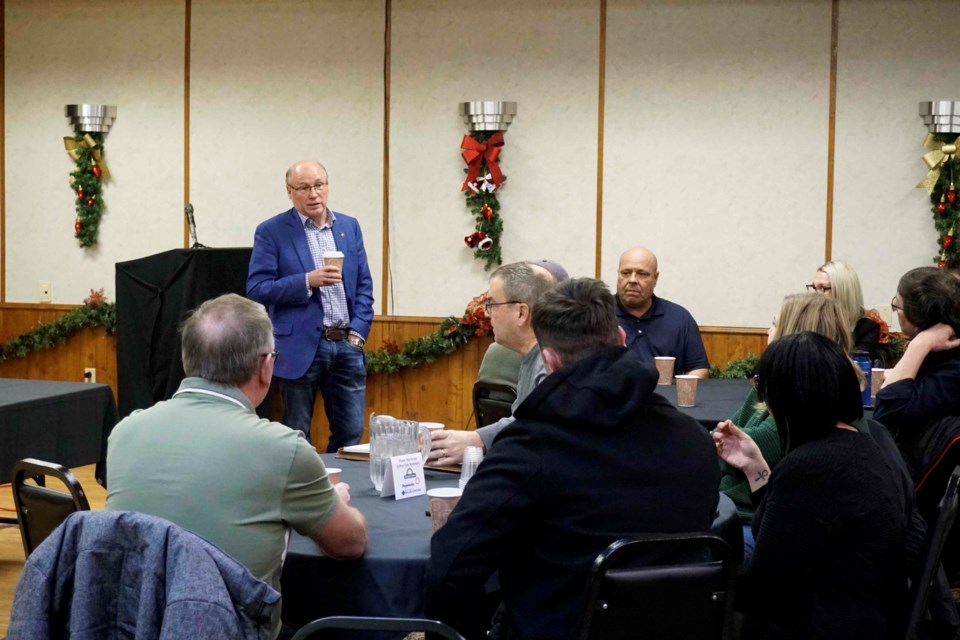ESTEVAN — Souris-Moose Mountain’s member of parliament recently visited with the local business community and brought them up to date on Ottawa's latest happenings.
Robert Kitchen was a speaker at the Coffee Talk organized by the Estevan Chamber of Commerce on Jan. 11, with about 30 business leaders present. He touched on the government's spending, the future of the energy sector and Canada, and took questions from the audience.
Kitchen started by pointing out that over his eight years in Parliament, he learned that the Liberal government prefers to call their spendings "investments". He also noted that there is a big gap in the government's understanding of what his and some other ridings are about.
"A lot of what I see happening with this government is trying to push rural Canada into urban Canada. And they're doing everything they can to basically shut down parts of Canada when they don't understand that concept. They have this utopian idea of what's going on," Kitchen said.
While the vision for switching to electric power all across the country has a place, there are many steps between now and then, Kitchen said.
"We need an energy source. And we need reliable energy. And that base energy is what we provide here in Estevan and the southeast corner of Saskatchewan," Kitchen said.
"The reality is, in order to electrify, we need four times the power source that we have here today. And in order to build that power source, number 1, we need five years to come up with the idea of what we are going to build. We need three to four years to actually build it. And then we need another two or three years to get out all the kinks. That's 12 years from now. And that's maybe if we were to build a 100-megawatt unit. But ultimately, we will need 1,000 megawatts. It's not going to happen overnight, and that's the big challenge. And the unfortunate part is what I see in Ottawa is people don't understand that.
"Those steps aren't happening in Ottawa. In my opinion, there's this image that everything's going to be beautiful, and it's going to be great. But they don't understand those steps to get there. And that is very concerning for where we're going to go."
Kitchen added that when he tries explaining the carbon capture and storage technology and the concept of clean coal to people in Ottawa, be it politicians or national media, they just don't want to listen.
"I talk with [national media reporters] about the great things that we're doing, and I said, 'Is it the industry you want to kill or the emissions?' And they said, 'The emissions, we don't want to kill the industry.' I said, 'Well, in my hometown, I've got a unit that captures 98 per cent of the emissions. Why are you trying to kill it?' 'Oh, no, no, we want them, we want them to keep working.' The moment I said it was BD3 and basically coal, they walked away from me," Kitchen shared.
"They don't understand how it is to live out in this part of the world. Those are challenges that we deal with day in and day out. My colleagues are on board with the aspect of recognizing where that power source is. And we will continue to push on that."
On another note, Kitchen pointed out that since the House of Commons reconvened in September and the Tories elected Pierre Poilievre as their new leader, the party has been going after the current government on the costs of day-to-day living for businesses and individuals, along with the government's approach to taxes, and they plan to continue with that.
Answering questions from the audience, Kitchen indicated that they see how mainstream media ignores stories they don't want to tell, and Poilievre's program still assumes the end of funding for media.
Kitchen was also asked what the Conservatives’ changes would be if they hypothetically win the next elections. He said their plan is a work in progress. They are developing policies to address climate change needs and other important issues. But the information on particular plans is usually not given out until election time so that someone else wouldn't steal concepts and ideas.
Kitchen added that he is working on a document that will underline the need to focus on killing the emissions, not industry. Another challenge they are dealing with is the electoral system in Canada that gives power to some regions while leaving others with less.
"Where the party will go on that, that's above my paygrade. But in discussions that I've seen around the table I haven't seen anything even talking about changing … We know that we need to win in a lot of ridings," Kitchen said.
Responding to a question about why the government is investing in supporting Ukraine instead of trying to bolster the Canadian economy, Kitchen pointed out that in his opinion tax dollars should, first of all, be going to help people in Canada. Later in the meeting he also said he sees an asset in people coming to Canada from Ukraine and other countries, as a lot of whom believe in the same values as Conservatives and if they decide to stay, they will help this country succeed.
"They [new Canadians] have been indoctrinated to believe that the Liberals are the ones that are going to listen to them. And they've managed to turn around and say, Conservatives are bad. We have to change that aspect because new Canadians are such a great value for us," Kitchen said, adding that there are many jobs to be filled in rural Canada, which new Canadians are willing to take, and the language barriers can be overcome.




